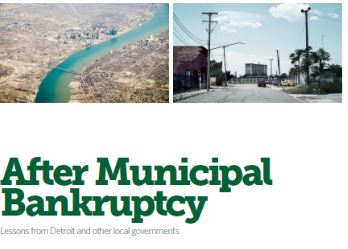After Detroit: Fiscal Lessons Learned for Other U.S. Municipalities
What Detroit’s bankruptcy can teach other municipalities about fiscal management

Detroit’s bankruptcy did not set off a national wave of municipal Chapter 9 filings, but the case continues to draw attention and serve as a warning to cities, villages and townships across the United States to keep their fiscal houses in order.
That’s according to Mary Murphy, the manager on The Pew Charitable Trusts’ state fiscal health and economic growth project. She was one of the authors of the new report “After Municipal Bankruptcy: Lessons from Detroit and other local governments.”
She spoke with WDET’s Sandra Svoboda. Listen to the interview at the above link.
Here is a full transcript of their conversation:
Sandra Svoboda: What is your report showing the significance of the Detroit bankruptcy was in the national context of municipal finance?
Mary Murphy: It’s important to keep in mind that every situation of municipal distress or bankruptcy is unique but there are some important shared lessons that can be learned from both Detroit and these other recent high-profile filings, and among those are that state and local governments first can try to prevent emergencies by regularly monitoring key fiscal indicators for signs of trouble. Also making sure to budget over the long term and making sure that their long-term obligations such as public pension costs and retiree health care benefits are well-managed.
SS: In the wake of the Detroit bankruptcy what’s been the effect on other municipalities that maybe have considered bankruptcy or not considered bankruptcy around the country?
MM: I think it’s important to keep in mind that bankruptcy has been a rare event and is likely to continue to be a rare event. Of the 55,000 municipalities that issue bonds in this country, fewer than 10 declare bankruptcy every year. I think that’s an important thing to keep in mind when we’re looking at the national picture. That said, it’s also important to note that budget pressures for both state and local governments are real, and particularly as we’ve seen this slow and uneven recovery from the recession, many local governments are facing real fiscal strain.
SS: In the report you helped author for the Pew Charitable Trusts — it’s called “After Municipal Bankruptcy: Lessons from Detroit and other local governments” — what are some of the lessons learned that can apply to several different kinds of municipalities.
MM: I think one important takeaway from Pew’s research is the importance of budgeting for the long term and making sure revenues and expenses are matched year to year. Another key lesson for both state and local policymakers is making sure your long-term obligations are well managed. That refers to public pension obligations, debts, post-retirement health care benefits, making sure that those benefits and costs are affordable, and that the government has a plan to meet that expense as well while also maintaining day-to-day services for its residents.
SS: If you’ll forgive the gross oversimplification of the dynamics of municipal bankruptcies, there are the issues of who gets paid first: pensioners or investors. How has the Detroit bankruptcy informed that conversation and that dialogue across the country?
MM: Exactly. This is certainly one of the central questions in any bankruptcy proceeding. Who should get paid back, how much, when and using which money. Pew notes that the bankruptcy is typically a painful process for all stakeholders and the residents of that place. In Detroit, for example, the federal bankruptcy judge did approve a plan that called for both bondholders and pensioners to accept losses. So current city workers were put into less generous retirement plans. Retired workers agreed to reduced pensions benefits. But investors also agreed to receive cents on the dollar. We really saw stakeholders across this collection of groups taking losses in the long run, and those dynamics, because this is really the central question in any bankruptcy proceeding, I think will really continue to get resolved on a case-by-case basis in any situation where this occurs.
After Municipal Bankruptcy PDF
